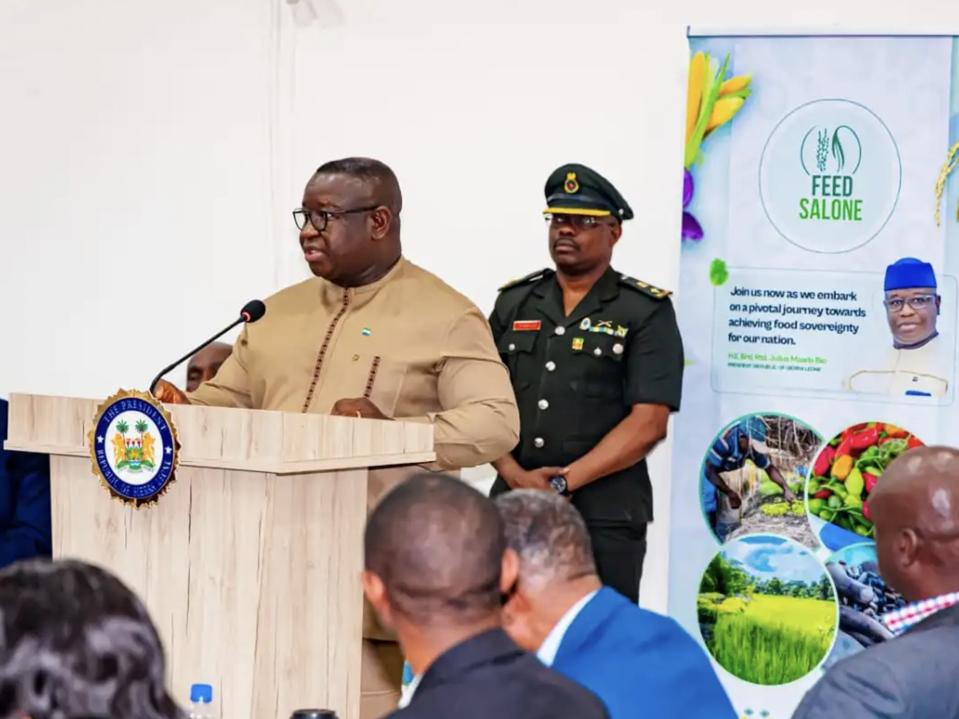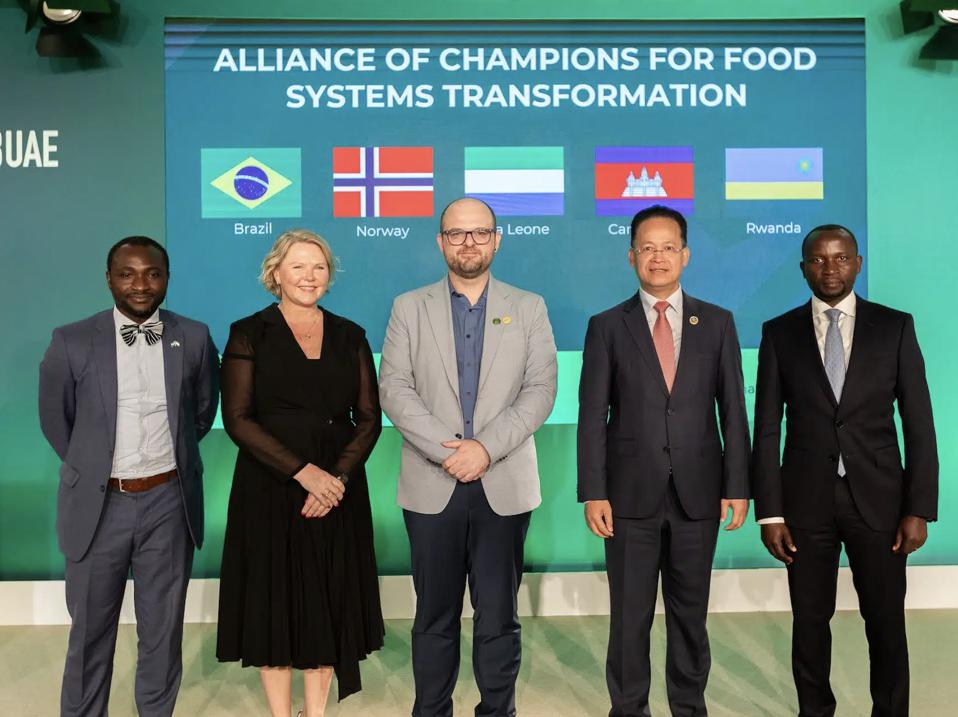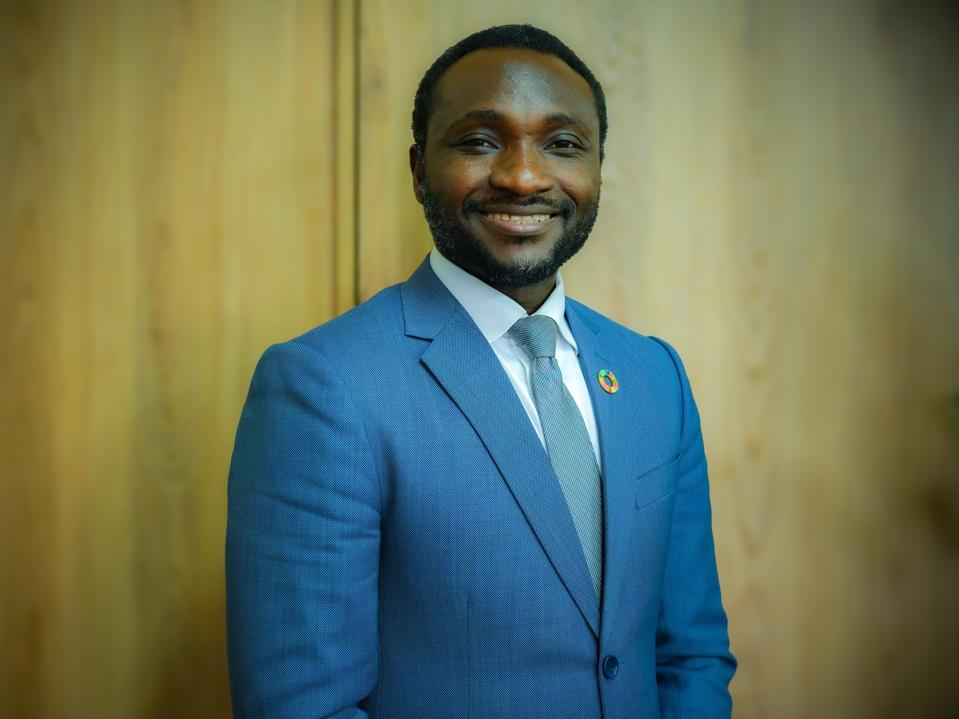Minister Henry Musa Kpaka is in Makeni, northern Sierra Leone, having just completed a day-long engagement with farmers, braving relentless rain. Tired but determined, he settles in at the first stop of a four-day, cross-country tour. Connecting with local farmers and agro-processors has become a defining part of his role as Minister of Agriculture and Food Security.
“There’s something magical about these visits,” Kpaka says, recounting how he is warmly welcomed into rural areas with dancing, fresh produce, and eager farmers— many of whom have never before seen a government minister in person.
“Spending time with them gives me energy and inspires me,” he says.
For a minister who frequently travels for up to 6 hours at a time to visit distant villages, there is something unique and very strategic about this trip, as it marks a major milestone in his mission to transform Sierra Leone’s agricultural landscape.
“I want to personally invite everyone to come to the east of the country; to bring all of their food and their merchandise for us to show what we’ve been able to achieve this year,” he says, highlighting plans for the first anniversary of Feed Salone, the country’s flagship food security program.
Appointed in August 2023 by President Dr. Julius Maada Bio to deliver on his mission for a bold agricultural transformation in Sierra Leone, Kpaka— a Harvard-educated technocrat with a Ph.D. in Political Economy from the London School of Economics— hit the ground running.
Within weeks of his appointment, he crafted the ambitious Feed Salone strategy to turn the President’s vision into action. On October 16, 2023— World Food Day— President Bio unveiled Feed Salone, a sweeping plan to reduce Sierra Leone’s reliance on foreign food imports, tackle malnutrition, bolster resilience to climate change, and uplift rural communities across the country.
The scars of Sierra Leone’s past are deep. It has been more than two decades since the end of a brutal civil war, but the legacy of that conflict— poverty, fractured infrastructure, and an agricultural sector stuck in subsistence farming— remains ever-present.
In his keynote address to the Feed Salone Roundtable in October 2023, President Dr Julius Maada Bio … [+]
Government of Sierra Leone
For Kpaka, this is personal. He spent his early childhood in Pujehun, one of the country’s poorest districts, raised by his grandmother, a subsistence farmer. He still recalls the pride that she and others like her had in growing what they ate.
“All of these things— you never know how they’ll seep into your consciousness, but they’re there,” he says.
After the war was over, a scholarship took him to high school in Singapore, and from there, he traveled to Kenya and Cambodia, volunteering in rural communities and absorbing lessons that would later guide his work.
In Kenya, the infrastructure he saw— roads and electricity in rural areas— struck him as extraordinary. “Even though they were poor, I could still see the richness they had,” he recalls. It was a pivotal moment, one that solidified his decision to eventually return home.
“If someone like me— with all I’ve learned— wouldn’t come back, then who would?” he asks.
Following his studies at Harvard and the London School of Economics, and after gaining valuable experience at organizations such as the Tony Blair Institute, the Bill & Melinda Gates Foundation and the World Bank, Kpaka would return to Sierra Leone, with a wealth of global knowledge but with a singular focus: to transform his homeland through agriculture.
“Agriculture chose me,” he says. “For me I could see beyond just growing crops, this was fundamental to changing the face of the country.”
Minister Henry Musa Kpaka walks through a maize field. “Agriculture chose me,” he says.
Government of Sierra Leone
For Sierra Leone or Salone, as it is called in the Krio language, Feed Salone is not just about increasing production— it’s about food sovereignty, a phrase Kpaka repeats often.
“In Sierra Leone, we believe that if someone controls the food you eat, they control you,” he says.
More than two decades following the civil war, Sierra Leone has remained vulnerable, reliant on global markets to meet its food needs. Despite two-thirds of the population being employed in agriculture, the country continues to import basic staples like rice. With one of the highest per capita rice consumption rates in the world, Sierra Leone spends nearly a third of its food import budget on this staple alone. These challenges have been exacerbated in recent years, particularly with major price fluctuations and disruptions to food, energy, and fertilizer supply chains.
“For cultural and habitual reasons, a huge chunk of our foreign exchange goes to this one thing that we used to export,” he says, sharing his desire to reclaim the pride in agriculture that existed before the Civil War— a time when rice was not only grown for domestic supply but also as an export crop.
During the past year, under the Feed Salone initiative, Sierra Leone has significantly boosted its investment in agriculture, raising the sector’s budget allocation from 2% to 7%, with a goal to reach 10% in 2025, in line with the Malabo Declaration.
Backed by President Bio’s leadership, Kpaka has secured over $1 billion in funding for Feed Salone from partners such as BADEA, IsDB, African Development Bank, the OPEC Fund for International Development and the World Bank, as well as a crucial $100 million from the African Development Bank at the Africa Food Systems Forum in Rwanda.
Henry Musa Kpaka, Minister for Agriculture and Food Security and Dr. David Moinina Sengeh, Chief … [+]
ACF
Transforming a country’s food system is no small feat. In a continent where bureaucracy often stifles progress, major agriculture initiatives like the Malabo Declaration have faced slow implementation and mixed success. To shift the odds, the Bio administration is pushing for a different kind of governance— an all-of-government approach, that cuts across ministries and leverages the President’s influence to get things done.
“This ensures that when critical tradeoffs need to be made, they are explicit, everyone understands them and when they are made, we back them,” Kpaka explains.
The cornerstone of Feed Salone is its emphasis on infrastructure— roads, energy, and transportation designed to connect agricultural hubs to the rest of the country. Kpaka’s vision is a strategic one: “If I had to choose between buying fertilizer and building a feeder road, I’d build the road,” he asserts.
“Infrastructure is key. There is no doubt,” he continues, inviting investors not to hesitate to invest in the country’s agriculture sector, despite infrastructure being a work in progress.
“With government working alongside the private sector, we can be fixing infrastructure while we are making investments in production,” he explains. “Yes, there is a risk when you don’t have infrastructure, but what you will enjoy when you come is a government that is going to provide the right set of policies, the right aftercare services that will show you that we want you to succeed. We are on your side.”
Feed Salone also focuses on increasing access to locally produced, nutrient-rich foods, with innovative strategies like substituting wheat flour with rice and cassava flour. The initiative also aims to turn Sierra Leone’s export crops— cocoa, coffee, cashews— into engines of economic growth and job creation.
Last year, at COP28, Sierra Leone took its local commitments to the international stage, joining 133 other nations in signing the Emirates Declaration on Sustainable Agriculture, Resilient Food Systems, and Climate Action, pledging to integrate food systems into climate strategies by 2025. Minister Kpaka also took on a leadership role as co-chair and founding member of the Alliance of Champions for Food (ACF) Systems Transformation, alongside Rwanda, Brazil, Norway, and Cambodia.
For Kpaka, it’s about showing that even a small country can have a big impact.
“I knew it was going to be hard, but I still raised my hand and said we’ll do it; this is the right thing to do, and we want to share our experience with the world,” he says. “Because we are a small country striving to do a big thing, we knew we would have to ask for help, and we are not ashamed to do that.”
Brazil, Norway, and Sierra Leone, as joint co-chairs, together with founding members Cambodia and … [+]
ACF
On World Food Day, October 16th 2024, the country celebrated the one-year anniversary of the Feed Salone program in Kailahun, a commercial center in the east of the country. Farmers and agro-processors accepted their minister’s invitation to showcase the fruits of their labor; stalls sold out and food was donated to the hospital, police, military, and schools.
Following the event, President Bio released a social media post, sharing how motivated he was by the success of the program.
“In the past year, we have achieved remarkable milestones, such as increased rice production, enhanced support for farmers, and improvements in infrastructure,” he said.
That day, Minister Kpaka also released the initiative’s first annual update.
In 2024, the Feed Salone Program achieved significant milestones. Among them was the distribution of inputs and machinery to over 90,000 farmers, the building of crucial rural roads and bridges, the launch of new agricultural financing options, and significant investments in high-yield seed varieties. Remarkably, for the second consecutive year, no rice seeds were imported— a clear indicator of the program’s success.
The vision behind Feed Salone extends beyond yields and supply chains; it’s about cultural transformation. It’s about regaining the pride that Sierra Leone’s agricultural sector once held before the war— a time when the country was self-sufficient in rice and even exported the grain.
“When I look back on my legacy… what I’ve achieved… I would like it to be where agriculture has become something that people are proud of again; something that people are getting a livelihood from. Only then will agriculture be sustainable.”
“When I look back on my legacy… what I’ve achieved… I would like it to be where agriculture has … [+]
Minister Henry Musa Kpaka
Kpaka beams as he speaks of the smallholder farmers, many like his grandmother, who make up the backbone of Sierra Leone’s agricultural sector. He hopes his own children, Hopanda and Nyali-Ella, will one day inherit a country that is not only food-secure but also proud of its agricultural roots.
Sierra Leone’s pursuit of food sovereignty is a powerful testament to its resilience and determination— a bold effort by a small, climate-vulnerable nation in West Africa to feed itself and, perhaps, to inspire others to follow its lead.
Henry Musa Kpaka describes his role as Minister of Agriculture and Food Security and leading this transformative movement as the greatest honor of his life. It’s not just about changing the way the country grows food; it’s about reshaping Sierra Leone’s future and reclaiming its agricultural legacy.
“Feed Salone is the flagship that is at the core of moving the country’s development forward,” he explains.
“If we get this right, we would make history.”





